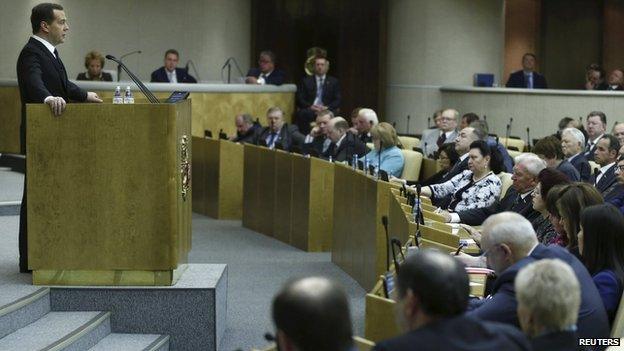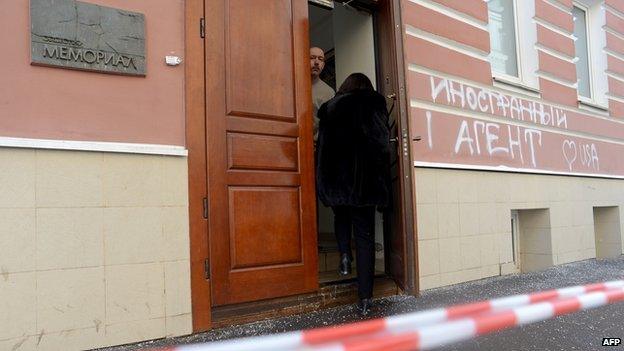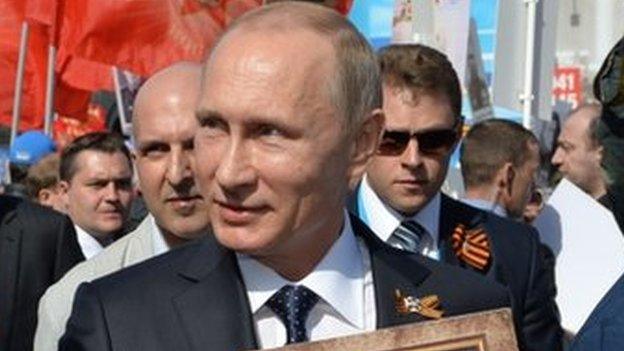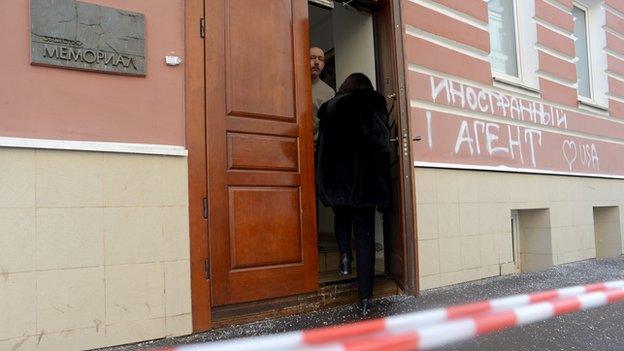Russia targets 'undesirable' foreign organisations
- Published

Pro-Putin parties dominate the lower house (Duma)
Russia plans to introduce new powers to prosecute foreigners whose activities are seen as "undesirable" on national security grounds.
Russian MPs have backed a bill to ban "undesirable" foreign non-governmental organisations (NGOs) or firms.
The draft leaves the definition of "undesirable" open to interpretation.
Under an existing 2012 law, foreign-funded Russian NGOs linked to politics must register as "foreign agents". The label has connotations of spying.
A party loyal to President Vladimir Putin drafted the new law. His supporters dominate both houses of parliament.
The text going through the Duma - Russia's lower house - says it will be up to Russian prosecutors and the foreign ministry to decide if a foreign organisation or firm is "undesirable".
A foreigner declared "undesirable" could face a fine of up to 500,000 roubles (£6,343; $10,000) and up to six years in jail.
The bill passed a second reading in the Duma on Friday. It still requires a third reading, then approval by the upper house (Federation Council) and President Putin to become law. In most cases that is a formality.
The legislation comes amid frosty relations between Russia and the West, characterised by sanctions and counter-sanctions over Russia's involvement in the Ukraine conflict.

March 2013: Graffiti scrawled on the offices of human rights group Memorial says "foreign agent"
Foreign firms included
The BBC's Yuri Vendik in Moscow says the legislation opens up foreign firms to potential prosecution, because it does not include the word "non-commercial" in the text.
The MP who drafted it, Alexander Tarnavsky of the party A Just Russia, said he wanted foreign businesses to be covered by the law.
"Unfortunately some foreign organisations for various reasons are working against Russia.
"They may be ideological reasons, or in the interests of shareholders, or economic interests, it's normal for them to say: 'Come on, let's push Russia down, so the value of Russian shares goes down, and then we'll buy them,'" he told the BBC.

'Pressure on foreigners' - Yuri Vendik, BBC Russian:
This law is a way of strengthening pressure on foreigners - it can be seen as a political step.
It doesn't give any criteria to define "undesirable", so it is not clear which organisations could be affected - the language is not precise.
In theory they can punish whoever they like - businesses, media organisations. Or it could be an oil firm, or someone in the financial sphere.
Non-governmental organisations are not clearly defined in Russian law.
The text has been finished - there won't be more amendments now. But there might be a procedural delay before the Duma's third and final reading.

Pavel Chikov, head of a human rights umbrella group called Agora, said: "Simply declaring someone 'undesirable, we don't want to see him on our territory' will be a violation of international law and general legal principles, and of the civil legal code."
He predicted "a mass of disputes over interpretation of the law".
In a commentary on the draft law, the popular Russian daily Moskovsky Komsomolets said the "undesirable" label could be applied to any foreign organisation, "commercial and non-profit alike".
It said NGOs such as Medecins Sans Frontieres, Amnesty International, Greenpeace, Reporters Without Borders and Transparency International "are certainly under threat".
It described the new law as a "weapon" that could be used "next time relations with the West escalate, or under the influence of paranoid 'anti-Maidan' nightmares" - referring to Russian fears of a Ukraine-style popular revolt against the government.
- Published15 May 2015

- Published22 March 2013

- Published19 September 2012
